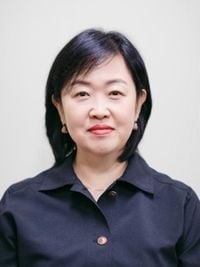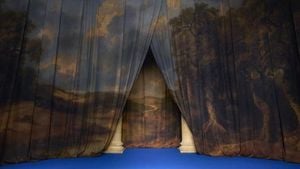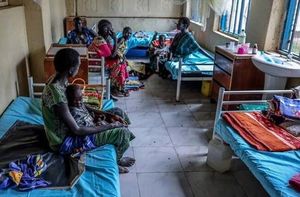On July 13, 2025, President Lee Jae-myung announced a significant reshuffle in his administration, appointing 12 vice-ministerial level officials across various government departments. Among these appointments, the most historic was the naming of Hong So-young as the new head of the Military Manpower Administration (MMA), marking the first time a woman has held this position since the agency's establishment in 1970.
Hong So-young’s career is a testament to dedication and expertise within South Korea’s military administrative framework. Born in 1965 in Suwon, Gyeonggi Province, Hong began her public service journey in 1988 as a 7th-grade competitive recruitment civil servant at the MMA. Over the decades, she has held numerous key roles, including head of the Military Service Disclosure Division, Information Planning Division, Military Service Resources Bureau, and most recently, the Daejeon-Chungnam Regional Military Manpower Administration. Her vast experience within the MMA’s internal structure distinguishes her from predecessors, who were often military officers rather than career civil servants.
Presidential Office spokesperson Kang Yu-jung highlighted the rationale behind Hong’s appointment during a briefing at the Yongsan Presidential Office. Kang emphasized that the decision was driven by considerations of policy continuity and practical, on-the-ground execution capabilities. She noted, "Hong So-young’s diverse experience within the Military Manpower Administration, her communication skills, and proactive work promotion have earned her strong trust within the organization. Being the first female head is not the sole reason for her appointment." This underscores a merit-based selection aimed at ensuring effective leadership rather than symbolic representation alone.
Hong’s appointment is particularly notable given that she is only the third MMA director general to be appointed from within the agency itself, breaking a two-decade trend where former military officers predominantly filled the role. Her background as an information and computerization expert within the MMA adds a modern dimension to her leadership, signaling a push toward digital innovation and efficiency in military manpower management.
Throughout her tenure, Hong has been recognized for her meticulous and detailed work style. In 2020, while serving as the only female military service judgment officer nationwide at the Gyeongin Regional Military Manpower Administration, she enhanced her expertise in military service judgments. This experience is expected to strengthen the fairness and trustworthiness of military service inspections under her leadership.
Moreover, during her leadership at the Daejeon-Chungnam Regional MMA, Hong championed policies aimed at preventing academic and career interruptions for conscripts, particularly students. She promoted initiatives that support stable military service and facilitate successful societal reintegration post-discharge. These efforts are set to gain momentum as she assumes her new role, aligning military service more closely with young people's career and educational aspirations.
Hong has also played a pivotal role in driving the digital transformation of military administration. Her involvement in system improvements aimed at enhancing the efficiency of military service resource management reflects a broader vision to innovate and modernize the MMA’s operations. In an era marked by demographic challenges such as population decline, her forward-thinking approach is anticipated to usher in a paradigm shift, integrating military service more seamlessly with social and economic development.
Her appointment also carries symbolic weight in breaking the traditionally male-dominated culture of the MMA. As the first female head, Hong’s leadership is expected to foster greater diversity and inclusivity within the agency, potentially inspiring broader cultural shifts in government institutions.
Alongside Hong’s historic appointment, President Lee’s personnel reshuffle included other notable figures. Cho Won-chul, a seasoned lawyer with 26 years of experience as a judge and attorney, was named head of the Ministry of Government Legislation. Cho’s appointment is anticipated to bolster the government’s legal expertise, though it has stirred some controversy due to his previous role as President Lee’s defense lawyer in the high-profile Daejang-dong case.
The Ministry of Education welcomed Choi Eun-ok as its new Vice Minister. A veteran education bureaucrat, Choi previously led the Higher Education Policy Office and is credited with fostering regional university development and educational innovation. Meanwhile, the Ministry of Science and ICT appointed Koo Hyuk-chae as its 1st Vice Minister, with Park In-kyu, a visiting professor of physics at the University of Seoul, taking charge of the Science and Technology Innovation Headquarters.
In the Ministry of Patriots and Veterans Affairs, Kang Yoon-jin was appointed Vice Minister. Kang holds the distinction of being the first female secretary and director within the ministry and is praised for her exceptional communication and interpersonal skills. The Ministry of Land, Infrastructure and Transport appointed Kang Hee-yup, an expert in both traditional transportation and future mobility, as its 2nd Vice Minister.
Supporting the President’s vision of fostering innovation and entrepreneurship, Noh Yong-seok, head of the Ministry of SMEs and Startups’ SME Policy Office, was appointed Vice Minister. Noh is expected to play a key role in realizing Lee’s ambition of ushering in an era of 100 unicorn companies in South Korea.
Other appointments include Lee Myung-gu as Commissioner of Customs, recognized for his blend of practical experience and theoretical knowledge from key customs posts in Seoul and Busan. Heo Min, a former professor of Earth and Environmental Sciences at Chonnam National University, was named head of the Cultural Heritage Administration, bringing expertise from his leadership in securing UNESCO Global Geopark certification for Mudeungsan National Park.
In public health, Lim Seung-kwan, who led the establishment of the Central Infectious Disease Hospital at the National Medical Center and has frontline COVID-19 response experience, was appointed director of the Disease Control and Prevention Agency. Lastly, Kang Ju-yeop, with a background in logistics policy and planning at the Ministry of Land, Infrastructure and Transport, was named head of the Happiness City Construction Agency, ensuring continuity and expertise in urban development.
President Lee’s appointments reflect a strategic blend of experience, expertise, and a push for modernization across key government sectors. The historic appointment of Hong So-young as the first female Military Manpower Administration head not only breaks longstanding gender barriers but also signals a renewed focus on fairness, innovation, and responsiveness within South Korea’s military administration. As these officials take their posts, the administration’s commitment to policy continuity and practical execution will be closely watched by both the public and political observers.




